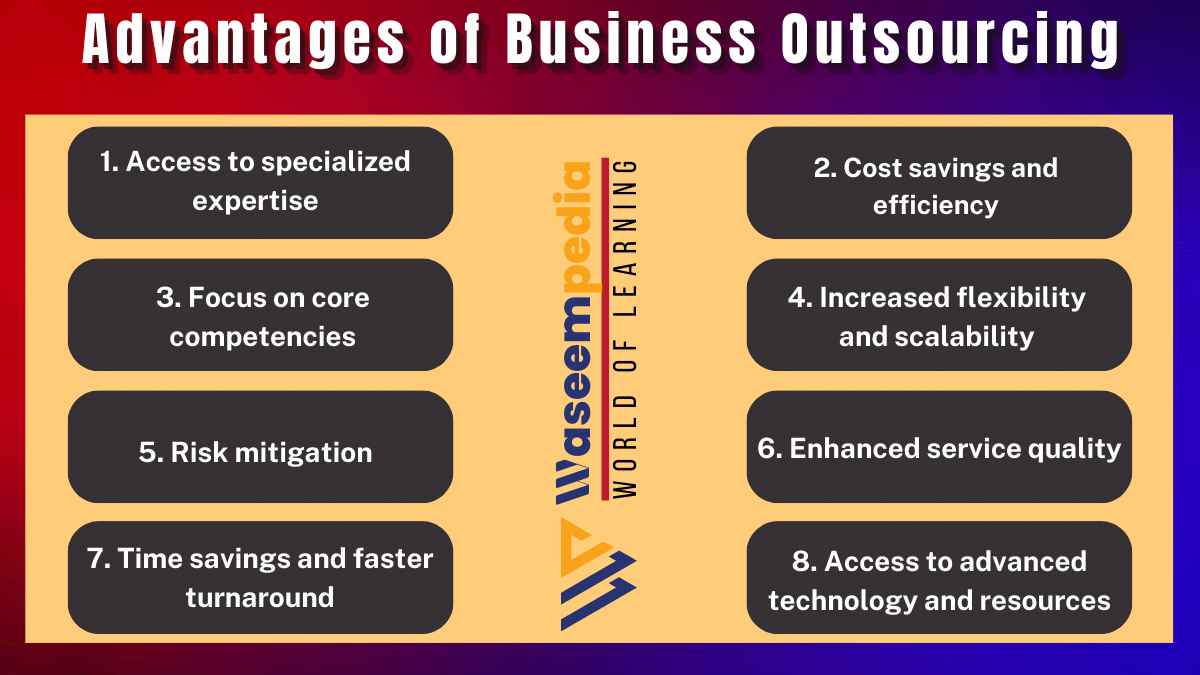Business outsourcing offers numerous advantages, including access to specialized expertise, cost savings, increased efficiency, and strategic advantages. By leveraging the capabilities of external service providers, organizations can drive operational excellence, focus on core competencies, mitigate risks, and gain a competitive edge in the dynamic business landscape. When implemented strategically and aligned with organizational goals, business outsourcing can be a powerful tool for success and growth.
In today’s competitive business landscape, organizations are constantly seeking ways to optimize their operations and focus on their core competencies. One strategy that has gained significant popularity is business outsourcing. Outsourcing involves delegating specific tasks or functions to external service providers. This article explores the advantages of business outsourcing and highlights how it can drive efficiency, cost savings, and strategic advantages for organizations.

Business outsourcing offers a range of advantages that can transform the way organizations operate. By partnering with external service providers, businesses can tap into specialized expertise, drive cost savings, and gain a competitive edge. Let’s explore the key advantages of business outsourcing.
9 Advantages of Business Outsourcing
There are many Advantages of Business Outsourcing but 9 Advantages of Business Outsourcing are as following.
1. Access to specialized expertise
One of the primary advantages of business outsourcing is the access to specialized expertise. By partnering with service providers who specialize in specific areas, organizations can benefit from their domain knowledge, experience, and best practices. This access to specialized expertise can help businesses improve the quality of their deliverables, make informed decisions, and stay ahead of the competition.
2. Cost savings and efficiency
Outsourcing certain business functions can lead to significant cost savings. External service providers often operate at lower labor costs, enabling organizations to reduce their operational expenses. Additionally, outsourcing eliminates the need for investments in infrastructure, technology, and training, further reducing costs. By leveraging economies of scale and efficient processes, outsourcing can drive operational efficiency and improve the overall financial health of the organization.
3. Focus on core competencies
Outsourcing non-core business functions allows organizations to focus their time, resources, and energy on their core competencies. By delegating tasks that are outside their area of expertise, businesses can concentrate on activities that directly contribute to their strategic objectives and value proposition. This focus on core competencies enhances productivity, innovation, and competitive advantage.
4. Increased flexibility and scalability
Outsourcing provides organizations with increased flexibility and scalability. As business needs fluctuate, organizations can easily adjust the scope and scale of their outsourced services. This agility allows businesses to respond quickly to market changes, seasonal demands, or unexpected growth opportunities. By leveraging the resources of external service providers, organizations can scale their operations up or down as required, without the burden of maintaining a large in-house workforce.
5. Risk mitigation
Outsourcing can help mitigate business risks. External service providers often have extensive industry knowledge and compliance expertise, reducing the risks associated with regulatory compliance, data security, and operational vulnerabilities. By partnering with experienced service providers, organizations can ensure compliance with industry standards, mitigate potential risks, and enhance their overall risk management strategy.
6. Enhanced service quality
Outsourcing certain functions to specialized service providers can lead to enhanced service quality. Service providers focus on delivering excellence in their specific domain, bringing a depth of knowledge and experience to the table. This expertise, combined with service level agreements (SLAs) and performance metrics, ensures that the outsourced tasks are executed with high standards of quality and efficiency.
7. Time savings and faster turnaround
Outsourcing time-consuming tasks can free up valuable time for organizations. By delegating tasks to external service providers, businesses can allocate their internal resources more efficiently, allowing them to focus on strategic initiatives, innovation, and customer-centric activities. Additionally, outsourcing can result in faster turnaround times, as service providers are often specialized and have streamlined processes in place.
8. Access to advanced technology and resources
Outsourcing can provide organizations with access to advanced technology, tools, and resources. Service providers continually invest in state-of-the-art technologies and infrastructure to deliver optimal results. By partnering with them, organizations can leverage these resources without having to make substantial investments on their own. This access to advanced technology can drive operational efficiency, improve productivity, and enhance the overall performance of the organization.
9. Improved competitive advantage
Business outsourcing can give organizations a competitive edge in the marketplace. By leveraging external expertise, cost savings, and streamlined processes, organizations can differentiate themselves from competitors. Outsourcing allows businesses to deliver high-quality products or services at competitive prices, respond to market demands more effectively, and focus on innovation and strategic growth initiatives.
Related FAQ’s
What are the advantages and disadvantages of outsourcing in a company?
Outsourcing offers advantages like cost savings, access to specialized skills, and scalability. It allows companies to focus on core competencies and save time. However, it can lead to a loss of control, quality concerns, communication challenges, security risks, and hidden costs. Careful consideration is essential when deciding whether to outsource or not.
What is the importance and benefits of outsourcing?
The importance and benefits of outsourcing include cost savings, access to specialized skills, increased efficiency, scalability, and the ability to focus on core business functions.
What is the purpose of outsourcing in business?
The purpose of outsourcing in business is to delegate non-core functions to external specialists or service providers to reduce costs, improve efficiency, and focus on core business activities.
What is the main characteristic of outsourcing company?
The main characteristic of an outsourcing company is its specialization in providing specific services or functions to other businesses, allowing those businesses to concentrate on their core operations while benefiting from the expertise of the outsourcing provider.
What are the advantages and disadvantages of outsourcing IT functions?
Advantages of outsourcing IT functions:
Cost savings
Access to specialized expertise
Scalability
Focus on core business
Risk reduction
Disadvantages of outsourcing IT functions:
Loss of control
Quality concerns
Security risks
Communication challenges
Hidden costs

